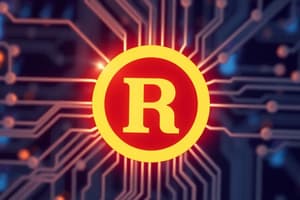Podcast
Questions and Answers
What type of assets does intellectual property law protect?
What type of assets does intellectual property law protect?
Intangible assets
What do patents grant to inventors?
What do patents grant to inventors?
Exclusive rights
In the context of intellectual property, what do trademarks protect?
In the context of intellectual property, what do trademarks protect?
Brand identifiers
What do copyrights cover in terms of creative works?
What do copyrights cover in terms of creative works?
What is the main focus of employment law in the relationship between employers and employees?
What is the main focus of employment law in the relationship between employers and employees?
What is a significant aspect of employment law in distinguishing between contractors and employees?
What is a significant aspect of employment law in distinguishing between contractors and employees?
What are the essential elements of a valid contract?
What are the essential elements of a valid contract?
Explain the concept of tort law in a business context.
Explain the concept of tort law in a business context.
What are some common remedies for breach of contract?
What are some common remedies for breach of contract?
Describe the different types of legal entities recognized by law.
Describe the different types of legal entities recognized by law.
What are some examples of issues in employment law?
What are some examples of issues in employment law?
How does tort law differ from criminal law in the context of business?
How does tort law differ from criminal law in the context of business?
Flashcards are hidden until you start studying
Study Notes
Business Law
Business law encompasses various areas of legislation that regulate how businesses operate within society. It includes several key subtopics, each with its own unique set of regulations and considerations. These subtopics are intellectual property, employment law, contracts, torts, and legal entities.
Intellectual Property
Intellectual property refers to creations of the mind, such as inventions, literary and artistic works, designs and symbols, names and images used in commerce. This area of business law protects these intangible assets through patents, trademarks, copyrights, and trade secrets. Patents grant exclusive rights to inventors for a certain period, while trademarks protect brand identifiers like logos and catchphrases. Copyrights cover original creative works, providing authors exclusive rights to reproduce, distribute, and perform their work. Trade secrets can be any type of information that is not generally known or reasonably accessible to others, and provides a competitive advantage to the owner.
Employment Law
Employment law governs the relationship between employers and employees. It covers areas such as wages and hours, workplace health and safety, discrimination, and termination of employment. One significant aspect of employment law is the distinction between independent contractors and employees. While contractors have more autonomy over their work, they do not receive the same benefits and protections as employees. Other important issues include sexual harassment, wrongful dismissal, and equal opportunity in hiring practices.
Contracts
Contracts form the backbone of many interactions in business law. They outline the terms, conditions, and expectations between parties involved in transactions. A valid contract must have offer, acceptance, consideration, intent, capacity, legality, and consent. Contract breaches occur when one party fails to meet its obligations under the agreement. Remedies for breach of contract may involve damages or specific performance.
Torts
Tort law deals with civil wrongs rather than criminal offenses. In a business context, it often involves disputes where one party seeks compensation from another due to harm caused by negligence or intentional action. Examples of common torts in business include defamation, trespassing, product liability, and fraudulent misrepresentation. Tort cases typically focus on whether harm was foreseeable, if reasonable care was taken to prevent the harm, and what damages were suffered as a result.
Legal Entities
Legal entities refer to distinct forms of business recognized by law as separate from their owners. Common types include corporations, partnerships, limited liability companies, and sole proprietorships. Each has its own advantages and disadvantages, including tax structure, personal liability for debts, ease of formation, and management control. For example, corporations offer personal asset protection, continuity despite ownership changes, and can issue stocks for capital infusion. However, they require complex paperwork and public disclosure.
Studying That Suits You
Use AI to generate personalized quizzes and flashcards to suit your learning preferences.




